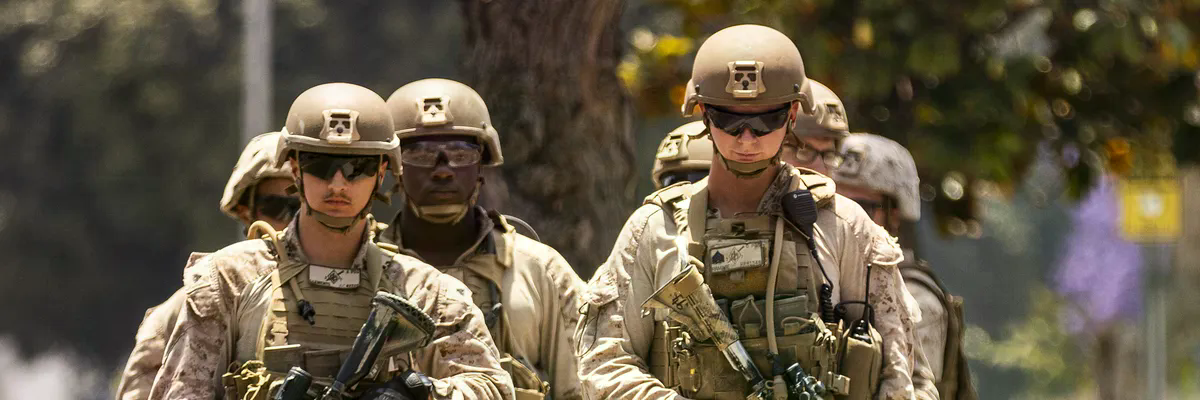
President Donald Trump has drawn significant criticism this week after expressing his willingness to deploy the U.S. military on American soil, raising concerns about the potential misuse of federal forces for domestic law enforcement.
According to reports from The New York Times, Trump made these remarks during a conversation with American troops stationed in Japan on Tuesday. He stated that he could send the military into U.S. cities under the pretense of addressing crime. “We have cities that are troubled, we can’t have cities that are troubled,” he said. “And we’re sending in our National Guard, and if we need more than the National Guard, we’ll send more than the National Guard, because we’re going to have safe cities.”
In recent months, Trump has deployed the National Guard to several major cities, including Los Angeles, Chicago, Memphis, and Portland. However, local and state officials have largely opposed these deployments and have filed legal challenges against them. Most recently, a federal appeals court agreed to rehear the administration’s case regarding the deployment of the National Guard to Portland, overturning an earlier decision that permitted the federalization of Oregon’s National Guard.
On Wednesday, a reporter from The New York Times asked Trump to clarify what he meant by “more than the National Guard.” In response, he suggested that he could deploy any branch of the military without oversight from courts or Congress. “If I want to enact a certain act, I’m allowed to do it,” Trump said. “I’d be allowed to do whatever I want. The courts wouldn’t get involved. Nobody would get involved. And I could send the Army, Navy, Air Force, Marines—I could send anybody I wanted.”
Earlier this month, Trump falsely claimed that the Insurrection Act grants him “unquestioned power” to deploy federal troops. The law permits the president to use the military in cases of extreme emergencies, such as violent rebellions. However, local officials in the cities targeted by Trump have denied that anti-Trump protests meet the high threshold required to invoke the law.
The Not Above the Law Coalition, composed of several civil rights and legal advocacy groups, strongly condemned Trump’s statements as “unlawful and un-American.” The coalition’s co-chairs, including Lisa Gilbert of Public Citizen, Praveen Fernandes of the Constitutional Accountability Center, Kelsey Herbert of MoveOn, and Brett Edkins of Stand Up America, criticized the president for suggesting that he and his administration can act without accountability.
“Our military exists to defend the nation and protect our freedoms, not to be weaponized against American cities,” they stated. “In his remarks today, Trump claimed that he and his administration cronies ‘can do as we want to do.’ That is as dangerous as it is unlawful and un-American.”
Retired Maj. Gen. Randy Manner, a former senior official in the National Guard, also criticized Trump’s actions. In a commentary published in the Home of the Brave newsletter, Manner called the National Guard deployments to U.S. cities “un-American and wrong.” He emphasized that the National Guard was traditionally intended to support U.S. forces overseas during wartime and to assist state governors during emergencies. Using the National Guard for routine police work, he argued, is unprecedented and inappropriate.
“Our military is not trained in law enforcement,” Manner said. “There are absolutely zero situations where our National Guard should be on the streets of America as a status quo measure, absent some acute short-term crisis. We would never send our sheriff’s deputies to Afghanistan for a special operation; it’s just as illogical to send highly trained combat soldiers and put them into civilian law enforcement roles.”
Trump first raised the possibility of deploying the U.S. military on American soil during the 2024 election campaign, stating that he could use it to confront a group of citizens he referred to as “the enemy from within.” His rhetoric escalated last month when he told a group of generals that “we should use some of these dangerous cities as training grounds for our military.”


